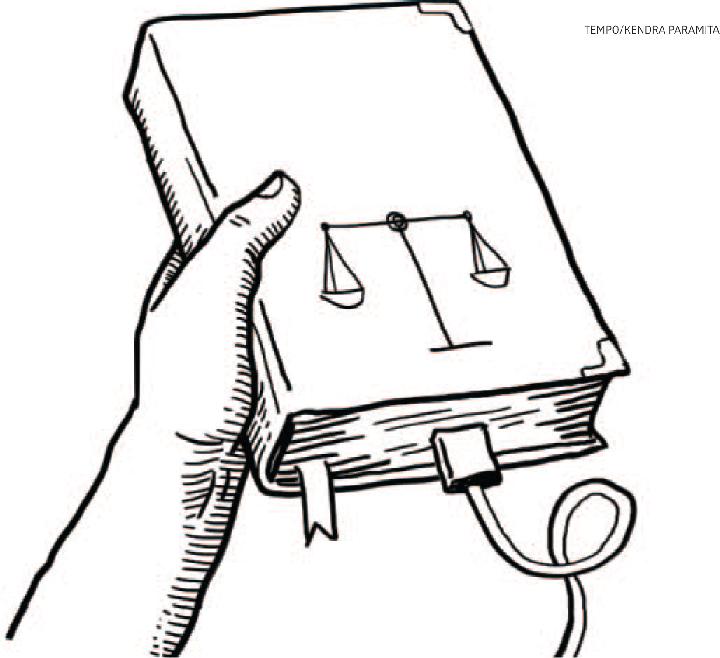Omnibus Is Throwing People and Democracy under the Bus
Translator
Editor
12 February 2020 22:18 WIB

By: Julio Achmadi, Member of Partnership for Governance Reform.
Joko Widodo has explicitly stated his goal in resolving Indonesia’s overlapping regulations through omnibus law during the inauguration speech back on October 20, 2019. There are four packages of omnibus law that are going to be enforced in Joko Widodo’s second presidential period, namely, Omnibus Law on Job Creation (Cipta Lapangan Kerja a.k.a Cilaka), The Nation’s Capital (Ibu Kota Negara), Tax Facility in Strengthening Economy (Fasilitas Perpajakan untuk Penguatan Perekonomian) and Pharmacy (Kefarmasian). A few weeks after the start of 2020, Jokowi then said that he wishes for the Draft Bill of Omnibus Law on Job Creation to be finished by Parliament in 100 days starting from the day it was submitted to the executive bodies. Onwards, the Parliament agreed on 50 priority draft bills in the 2020 National Legislation Program (Program Legislasi Nasional) to be passed in the said year which includes all of the omnibus law packages. However, the process and acceleration of omnibus laws are not transparent. There was minimum to none public participation, especially those who will be affected greatly by it. Moreover, the Omnibus Law Task Force was dominated by the business owners. For instance, the Omnibus Law on Job Creation has yet to receive feedback from civil society as it was conducted discreetly and not made public, just like what happened with revision on Law 30/2002 on Corruption Eradication Commission (KPK). Unsurprisingly, labor unions retaliated by taking up the streets on January 20, 2020.
The first omnibus law was arguably introduced back in 1888 by United-States on transportation bill. It became popular in 1967 and has been practiced in various other countries such as Canada, Australia, Germany, Turkey, The Philippines, Cambodia, Vietnam, Malaysia, etc. Foreign experiences have shown that the omnibus technique can be implemented in both civil law and the common law legal system.
In Indonesia, it seems that the purpose of omnibus law is solely and exclusively to appeal to investors. Based on the current political situation, the government will most likely nullify and put aside other aspects of governance such as human rights, welfare, and environmental sustainability at the expense of economic growth (that cannot be guaranteed by passing omnibus laws). Technically, public participation is the soul of democracy. Without it, there’s no democracy. The process of issuing omnibus law without taking the public’s opinion into account manifests the government’s lack of understanding of democracy and they should be ashamed of it. The public has been crying out loud to be involved, yet they were ignored.
Based on a similar experience, the government previously decided to castrate KPK with the issuance of new Law 19/2019 on KPK and appointment of problematic people as head of KPK. The revised law was passed beside the absence of public participation. The result as the people can see today, KPK is having a hard time just to arrest one of their suspects. Subsequently, the government is continuously losing trust from the public with their stealthy activities.
Substantially, civil society organizations have shouted their skepticism on the omnibus law, especially the Cilaka ones because it will undermine the effort of the labor movement, promote modern-day slavery, damage the environment, marginalize the most marginalized groups, create the opportunity for corruption and criminalization for the sake of facilitating business entities. Omnibus on Cilaka is heavily beneficial for people inside the vortex of power. It should have been called Oligarch Omnibus instead.
As a democratic state based on law, Indonesia has to commit to ensuring public participation as a prerequisite in passing a law. Logically, affected people have to be allowed to speak their mind and be involved in the process. In this omnibus law case, workers, women and indigenous people are the groups who will be greatly impacted. Puan Maharani, the Speaker of House of Representative (DPR) was correct in saying that discussion of omnibus law should not be conducted in haste. Solving the problem of overlapping regulations through omnibus law is a fresh idea and might worth the shot. However, the problem lies when the government decided to ditch the public’s opinion and produce the law for the sake of the oligarch.
Due to the fact that Joko Widodo’s government since 2014 did not have a good track record on human rights fulfillment and legal enforcement, he has to stop smudging his leadership further by solving overlapping regulations in an anti-democratic manner. The participation of civil society elements, especially labor, women, indigenous people, human rights and environmental organizations are an absolute necessity.
A study by World Bank in implementing the omnibus legislative technique in Vietnam stated that certain conditions have to be met in implementing omnibus law. First, horizontal and vertical comprehensive review of relevant laws and regulations have to be conducted. The concept is similar to the regulation harmonization process of Directorate General of Legislation, but this is on existing laws and regulations rather than draft bills. Second, the review results have to be widely disseminated to different stakeholders and used to make specific recommendations. This condition highlights the importance of all stakeholders’ participation.
Moreover, if Indonesia wants to create precedent in issuing omnibus law, it has to be conducted in parallel with strengthening independent oversight institutions such as National Human Rights Commission (Komnas HAM), National Commission on Elimination of Violence Against Women (Komnas Perempuan), KPK, Witness and Victim Protection Agency (LPSK) and Ombudsman. Thus, creating access to justice and a method of checks and balances should violations of human rights occur from the implementation of omnibus law. Without conducting the aforementioned acts, omnibus law will only throw people and our democracy under the bus.
*)
DISCLAIMER
Articles published in the “Your Views & Stories” section of en.tempo.co website are personal opinions written by third parties, and cannot be related or attributed to en.tempo.co’s official stance























